2015 Dodge Challenger SXT
SRT Hellcat’s Little Brother
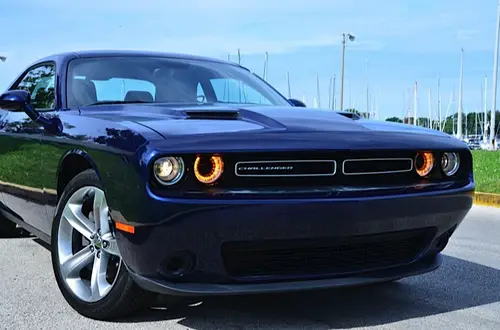
By Larry Nutson
Senior Editor, Chicago Bureau Chief
The Auto Channel
The slightest mention of Dodge Challenger will have anyone who is
even loosely connected to the automotive scene think of the supercharged
707HP Challenger SRT Hemi Hellcat.
Well, not every Challenger can be an SRT Hellcat and not every
Challenger buyer can step up to the $59,995 price nor can they use the
Hellcat’s astonishing
performance. The most powerful U.S. car of all
time has its rightful place.
Dodge offers eight different Challenger models, three different
engines along with two different transmissions to choose from.
Additionally, there’s a Challenger SRT available with the
aforementioned Hemi Hellcat or a 392 Hemi.
The 2015 Challenger is available in eight trim levels (see all specs below review): SXT, SXT
Plus, R/T, R/T Plus, R/T Shaker, R/T Plus Shaker, R/T Scat Pack and 392
HEMI Scat Pack Shaker.
SXT and SXT Plus models come with the 305HP 3.6-liter Pentastar V-6
mated to a TorqueFlite eight-speed automatic.
R/T, R/T Plus, R/T Shaker and R/T Plus Shaker get the 375 HP
5.7-liter HEMI V-8 that develops 410 lb.-ft. torque and is mated to either
a Tremec six-speed manual or the eight-speed automatic.
The two Scat Pack models have a new 485 HP 6.4-liter HEMI V-8 that
develops 475 lb.-ft. torque and can be mated with the Tremec six-speed
manual or the eight-speed automatic. These Challenger models can do 0-60
mph in the mid-4 second range with the new TorqueFlite eight-speed
automatic transmission and cover the quarter mile in the low-12 second
range. Top speed is a very fast 182 miles per hour (mph).
Adding to this model range, the 2015 Dodge Challenger SRT Hellcat
features the all-new supercharged 707HP 6.2-liter HEMI. Challenger
SRT’s standard 392 HEMI V-8 delivers 485 horsepower and 475 lb.-ft.
of peak torque. The TorqueFlite eight-speed automatic transmission is
equipped on both new Dodge Challenger SRT models.
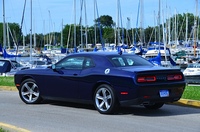
I spent a week driving the little brother in the Challenger family;
the V6 powered Challenger SXT. Priced at $26,995 to start, my SXT was also
equipped with a $495 Sound Group which begat more
watts and more speakers.
A $1400 Super Sport Group gave this car 20-inch wheels, 245/45 tires,
paddle shifters, performance brakes and a trunk lid spoiler. Throw on a
body side stripe for $395 and the $995 8.4 inch touch screen media center
with Uconnect access, HD radio and a
navigation system, add in the
no-choice $995 destination charge and we end up totaled at $31,275.
Now there’s a couple interesting facts to point out on this
pony car compared to the other two, namely Mustang and Camaro. The
Challenger is a bit larger, built on the same platform as the Charger, and
that helps with space. It’s a five-seater, has a large 16.2 cuft
trunk, and the rear seat is 60/40 split fold down to make even more cargo
room.
The SXT V6 Challenger is by no means a slouch with its 305HP.
Chrysler says it does zero to 60 mph in the low 6 seconds. Conveniently,
Chrysler provides an on-board performance indicator that saves you from
holding a stopwatch and trying to be accurate. Simply scroll the IP display
to the 0 to 60 mph timer, come to a stop, wait a bit and then ram the
throttle to the floor and the tenths of a second tick off until you hit
60mph. I did a few runs and managed a 6.4 second 0 to 60 time. It’s
not an easy and slightly risky feat to pull this off on the expressways of
a crowded city, but I will say had I
done a couple more runs I believe I
could have knocked off a tenth or two.
On the other end of the spectrum is fuel economy performance. The
EPA test ratings for the V6 Challenger SXT are 23 mpg combined, with 19 mpg
city and 30 mpg highway. Fill the 18.5 gallon fuel tank and a road trip can
be non-stop for 550 miles or so. That is, if you take it easy on the
throttle applications. But you will find the throaty exhaust tempting you
to be heavy on the gas pedal.
Handling is quite nice on the Challenger with its independent front
suspension with high upper “A” arms, coil spring over
gas-charged monotube shock absorbers and stabilizer bar, and lateral and
diagonal lower links with dual ball joint knuckles. In the rear is a
five-link independent with coil springs, gas-charged monotube shock
absorbers, stabilizer bar and isolated suspension cradle.
The optional performance brakes on this SXT have 13.6 inch vented
rotors and dual piston calipers, which is enough to handle the 3834 pound
SXT. Steering is electric powered and I thought feedback to be good and
nicely weighted coming back through the well designed sport steering wheel.
Even though the Challenger has been around since its revival in
2009,
Dodge went more-retro this
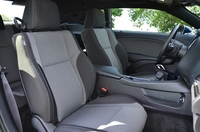
year with a 1971-inspired design, both
inside and out. There’s a new split grille, more pronounced and
functional power bulge hood,
LED halo headlamps and LED tail lamps. On the
inside the all-new interior with 1971-inspired high-sill center console and
driver-focused instrument panel is now available in 14 different color and
trim selections, including throwback Houndstooth cloth to Ruby Red,
Tungsten or Pearl with Black leather performance seats. Houndstooth or
hound dog, whatever.
Outward visibility and sight lines are quite good on the Challenger
and the interior fit, finish and quality of material is pleasing to both
the eye and to the touch. The infotainment and nav systems performed well
and were easy to operate.
Dodge didn’t leave out safety on the Challenger. A rear view
camera is available as is a new Adaptive cruise control, Blind-spot
Monitoring and Rear Cross Path detection as well as Forward Collision
Warning.
Dodge says the Challenger is “built by car guys for car
guys.” But we know that “guys” is really not gender
specific in today’s world and female as well as male car guys will
really have fun with a 2015 Challenger.
© Larry Nutson



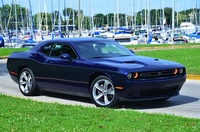

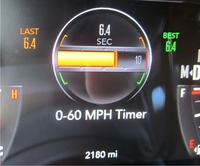
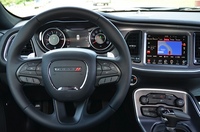
 year with a 1971-inspired design, both
inside and out. There’s a new split grille, more pronounced and
functional power bulge hood,
year with a 1971-inspired design, both
inside and out. There’s a new split grille, more pronounced and
functional power bulge hood, 





